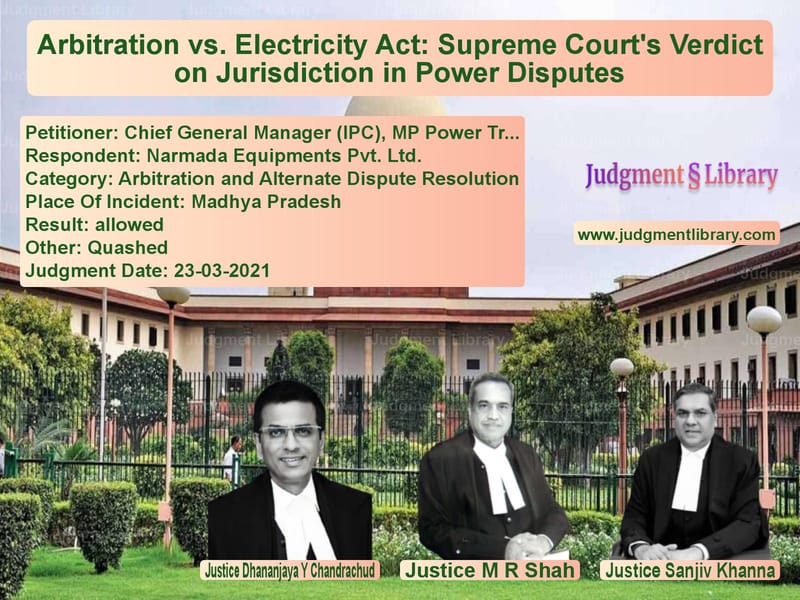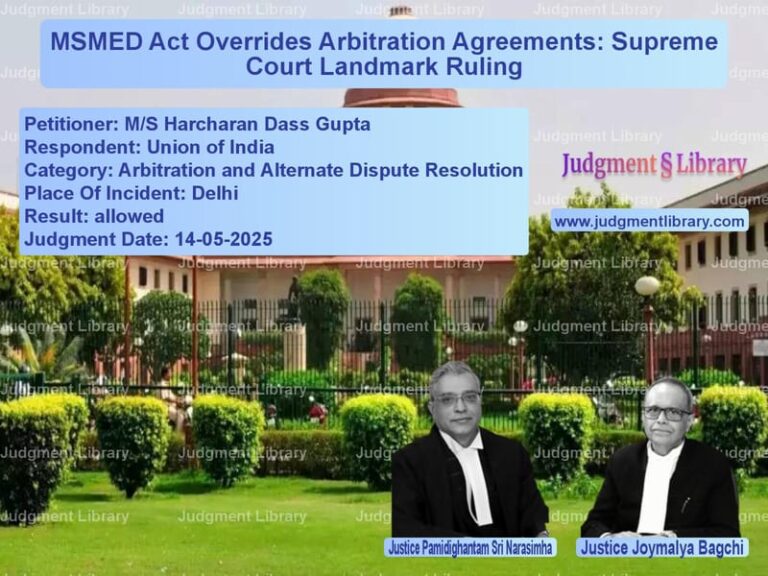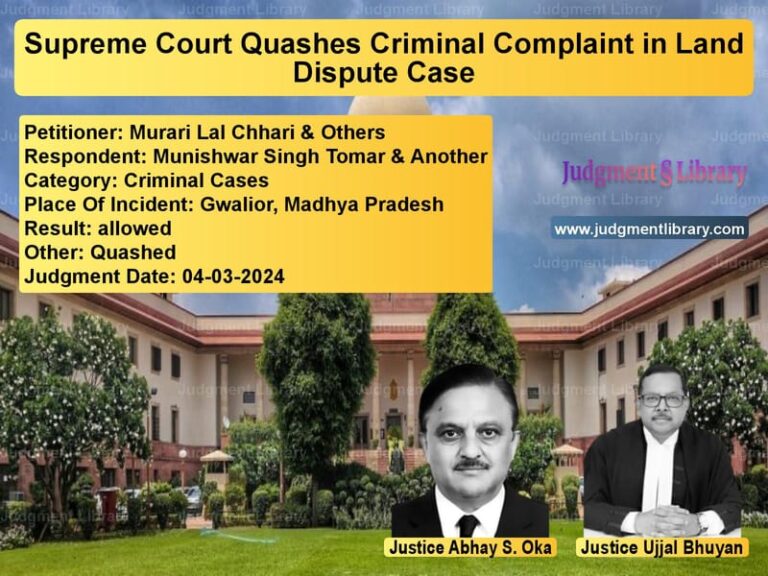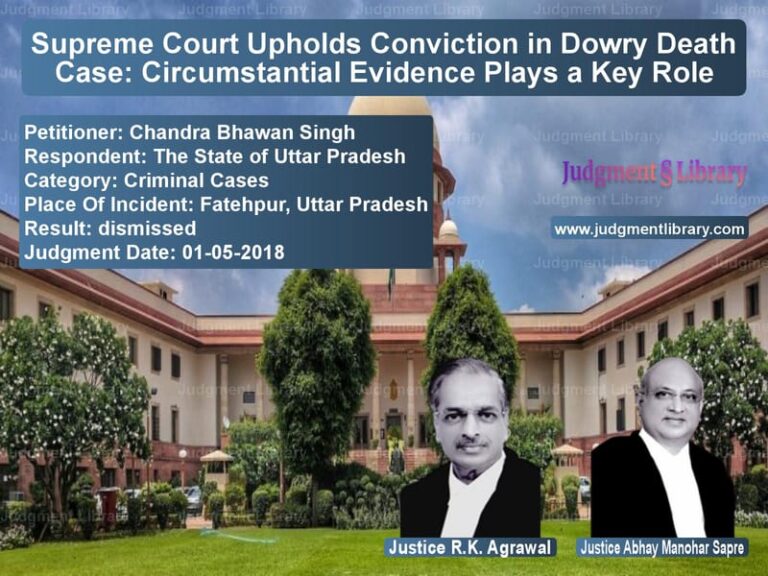Arbitration vs. Electricity Act: Supreme Court’s Verdict on Jurisdiction in Power Disputes
The case of Chief General Manager (IPC), MP Power Trading Co. Ltd. vs. Narmada Equipments Pvt. Ltd. addresses a crucial jurisdictional conflict between the Arbitration and Conciliation Act, 1996, and the Electricity Act, 2003. The Supreme Court ruled on whether disputes between electricity licensees and generating companies should be resolved under the arbitration clause in their contracts or through the statutory mechanism under the Electricity Act.
Background of the Case
The dispute arose from a Power Purchase Agreement (PPA) signed on May 20, 1999, between the Madhya Pradesh Electricity Board and Narmada Equipments Pvt. Ltd. Under this agreement, Narmada Equipments was to establish a mini hydro-electric project. However, on September 27, 2001, the Electricity Board terminated the PPA. This led to a prolonged legal battle over the validity of the termination and the appropriate forum for resolving the dispute.
The respondent initially filed a writ petition challenging the termination, but the High Court ruled that the dispute must be resolved through arbitration as per the contract. Subsequently, in 2011, the respondent issued a notice invoking arbitration. However, the appellants argued that jurisdiction lay with the State Electricity Commission under Section 86(1)(f) of the Electricity Act, 2003, and not under the Arbitration and Conciliation Act.
Legal Issues Before the Supreme Court
The Supreme Court examined the following key issues:
- Whether the dispute resolution process outlined in the Electricity Act, 2003, overrides the arbitration mechanism in the Power Purchase Agreement.
- Whether the High Court had the authority to appoint an arbitrator under Section 11(6) of the Arbitration and Conciliation Act, despite the existence of Section 86(1)(f) in the Electricity Act.
- Whether the principle of consent-based arbitration applies when statutory jurisdiction has been established under another law.
Arguments of the Parties
Petitioner’s Arguments (MP Power Trading Co. Ltd.):
- The Electricity Act, 2003, is a special legislation that provides an exclusive mechanism for resolving disputes between electricity licensees and generating companies.
- Section 86(1)(f) of the Electricity Act mandates that such disputes be adjudicated by the State Electricity Commission, not by an arbitral tribunal.
- The High Court erred in appointing an arbitrator, as this contravenes the established precedent in Gujarat Urja Vikas Nigam Ltd. v. Essar Power Ltd.
- The principle of jurisdiction cannot be waived, and consent cannot override statutory mandates.
The Supreme Court noted the petitioner’s argument: “Section 86(1)(f) of the Electricity Act is a special provision that overrides the general provision in Section 11 of the Arbitration Act.”
Respondent’s Arguments (Narmada Equipments Pvt. Ltd.):
- The PPA was executed before the Electricity Act, 2003, came into force, making the arbitration clause in the agreement valid.
- The parties had agreed to arbitration in a previous proceeding, and the appellants did not challenge jurisdiction at that stage.
- Even if the Electricity Act applies, it does not nullify the arbitration clause in the contract, as both remedies exist independently.
Supreme Court’s Analysis
1. Exclusive Jurisdiction of the Electricity Act
The Court reaffirmed the principle established in Gujarat Urja Vikas Nigam Ltd. v. Essar Power Ltd., ruling that disputes under PPAs involving electricity licensees and generating companies must be adjudicated by the State Electricity Commission under Section 86(1)(f). The Court stated:
- “When the statute directs that a dispute must be resolved by a specific authority, it overrides general dispute resolution mechanisms such as arbitration.”
- “The word ‘and’ in Section 86(1)(f) must be read as ‘or,’ meaning the Commission can either adjudicate the dispute or refer it for arbitration.”
2. No Waiver of Jurisdiction
The Court rejected the argument that MP Power Trading Co. Ltd. had waived its right to object by previously agreeing to arbitration. It held:
- Jurisdiction cannot be created by consent if a statutory framework mandates a different dispute resolution process.
- “If there is an inherent lack of jurisdiction, the plea can be raised at any stage and even in collateral proceedings.”
3. Overriding Effect of the Electricity Act
The Court emphasized that Section 174 of the Electricity Act gives it overriding effect over any other law in case of inconsistency. It observed:
- “The Electricity Act provides a complete code for resolving disputes in the power sector.”
- “Since Section 86(1)(f) governs disputes between electricity licensees and generating companies, Section 11 of the Arbitration Act is inapplicable.”
Final Judgment
The Supreme Court set aside the High Court’s decision and ruled:
- Disputes between electricity licensees and generating companies must be resolved under the Electricity Act, 2003.
- The State Electricity Commission has exclusive jurisdiction to adjudicate such disputes or refer them to arbitration.
- The appointment of an arbitrator under Section 11(6) of the Arbitration Act was without jurisdiction and must be quashed.
- The respondent is free to pursue remedies under the Electricity Act before the appropriate forum.
The judgment reinforces that sector-specific legislations like the Electricity Act take precedence over general laws like the Arbitration and Conciliation Act in matters where exclusive jurisdiction is prescribed. This ruling strengthens regulatory oversight in the power sector and clarifies the legal position on arbitration in statutory frameworks.
Petitioner Name: Chief General Manager (IPC), MP Power Trading Co. Ltd..Respondent Name: Narmada Equipments Pvt. Ltd..Judgment By: Justice Dhananjaya Y Chandrachud, Justice M R Shah, Justice Sanjiv Khanna.Place Of Incident: Madhya Pradesh.Judgment Date: 23-03-2021.
Don’t miss out on the full details! Download the complete judgment in PDF format below and gain valuable insights instantly!
Download Judgment: chief-general-manage-vs-narmada-equipments-p-supreme-court-of-india-judgment-dated-23-03-2021.pdf
Directly Download Judgment: Directly download this Judgment
See all petitions in Arbitration Awards
See all petitions in Commercial Arbitration
See all petitions in Dispute Resolution Mechanisms
See all petitions in Institutional Arbitration
See all petitions in Enforcement of Awards
See all petitions in Judgment by Dhananjaya Y Chandrachud
See all petitions in Judgment by Mukeshkumar Rasikbhai Shah
See all petitions in Judgment by Sanjiv Khanna
See all petitions in allowed
See all petitions in Quashed
See all petitions in supreme court of India judgments March 2021
See all petitions in 2021 judgments
See all posts in Arbitration and Alternate Dispute Resolution Category
See all allowed petitions in Arbitration and Alternate Dispute Resolution Category
See all Dismissed petitions in Arbitration and Alternate Dispute Resolution Category
See all partially allowed petitions in Arbitration and Alternate Dispute Resolution Category







